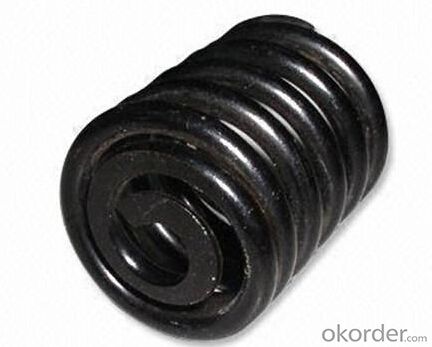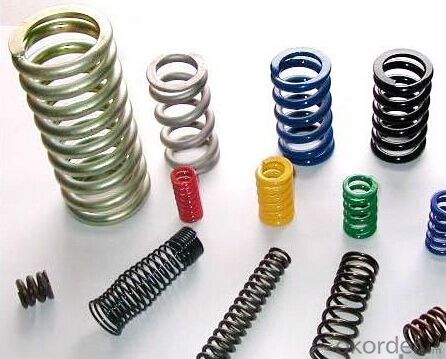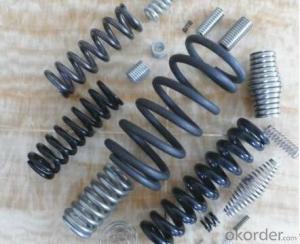Compression Spring Heavy Duty with Stainless Steel
- Loading Port:
- China Main Port
- Payment Terms:
- TT or LC
- Min Order Qty:
- 50 m.t.
- Supply Capability:
- 1000 m.t./month
OKorder Service Pledge
OKorder Financial Service
You Might Also Like
Product Description:
OKorder is offering Compression Spring Heavy Duty with Stainless Steel at great prices with worldwide shipping. Our supplier is a world-class manufacturer of steel, with our products utilized the world over. OKorder annually supplies products to European, North American and Asian markets. We provide quotations within 24 hours of receiving an inquiry and guarantee competitive prices.
Product Applications:
Compression Spring Heavy Duty with Stainless Steel are ideal for structural applications and are widely used in the construction of buildings and bridges, and the manufacturing, petrochemical, and transportation industries.
Product Advantages:
OKorder's Compression Spring Heavy Duty with Stainless Steel are durable, strong, and resist corrosion.
Main Product Features:
· Premium quality
· Prompt delivery & seaworthy packing (30 days after receiving deposit)
· Corrosion resistance
· Can be recycled and reused
· Mill test certification
· Professional Service
· Competitive pricing
Features of Heavy Duty Compression Spring:
1) Easily adjusted in coil diameter and pitch
2) Major materials: music wire, stainless
Features:
1) Easily adjusted in coil diameter and pitch
2) Major materials: music wire, stainless steel wire, oil tempered wire, spring steel
3) Different wire diameters, such as Ø4.0mm, 5.0mm, 8.0mm and 12.0mm
4) We possess a whole set of CNC manufacturing and testing equipment ranging from wire tensile strength tester, shot peering machine, deburring machine, magnetic powder flaw detector and compression tester heavy duty compression springs
5)What kind of shape compression spring we can do for you?
Spring shape: Conical, Round and Rectangular, Hourglass, Barrel, Constant Pitch, Variable Pitch etc. see picture below
Product Information | |
product name | Heavy Duty Piston Compression Spring |
brand name | YD |
model number | YD009 |
certificate | ISO9001,RHOS |
material | carbon steel,alloy spring steel,music wire steel,and stainless steel,iron,plated steel,alloy steel,bronze,red bronze,phosphor copper,and beryllium copper;etc |
usage | car,all kinds of machines,motor,etc. |
galvanized | nickel-plated, chrome-plated, silver-plated, gold-plated, imitation gold-plated and so on or as your request |
package | all springs will be carefully packed and shipped to you with PE bags. |
payment | TT/LC |
shipment | all orders are dispatched within 7-10 business days by EMS, DHL or as your request after making payment.A Tracking Number will be sent to you via e-mail after your order has been shipped.If you do not receive the Tracking Number email within 7 business days of confirming payment, please check your spam folder and then contact us. |
PLEASE NOTE: Please allow 5-9 business days for your shipment to arrive. | |
FAQ:
Q1: Why buy Materials & Equipment from OKorder.com?
A1: All products offered byOKorder.com are carefully selected from China's most reliable manufacturing enterprises. Through its ISO certifications, OKorder.com adheres to the highest standards and a commitment to supply chain safety and customer satisfaction.
Q2: How soon can we receive the product after purchase?
A2: Within three days of placing an order, we will begin production. The specific shipping date is dependent upon international and government factors, but is typically 7 to 10 workdays.
Q3: What makes stainless steel stainless?
A3: Stainless steel must contain at least 10.5 % chromium. It is this element that reacts with the oxygen in the air to form a complex chrome-oxide surface layer that is invisible but strong enough to prevent further oxygen from "staining" (rusting) the surface. Higher levels of chromium and the addition of other alloying elements such as nickel and molybdenum enhance this surface layer and improve the corrosion resistance of the stainless material.


- Q:How does special steel contribute to the robotics industry?
- Special steel plays a crucial role in advancing the robotics industry in multiple ways. Firstly, special steel alloys possess exceptional mechanical properties, making them ideal for manufacturing various robotic components. These alloys can provide superior strength, durability, and resistance to wear and tear. As a result, robots built with special steel can operate efficiently and reliably in demanding environments, such as manufacturing plants or hazardous locations. Moreover, special steel alloys offer excellent heat resistance and thermal stability. This characteristic is particularly important in the robotics industry, as robots often generate significant heat during operations. Special steel components can withstand high temperatures without deforming or losing their structural integrity. This capability ensures that robots can operate at their optimal performance levels without the risk of mechanical failures caused by heat-related issues. Additionally, special steel's corrosion resistance is highly beneficial for the robotics industry. Robots are increasingly being deployed in diverse applications, including underwater exploration, chemical handling, and outdoor environments. In such cases, exposure to moisture, chemicals, or harsh weather conditions can lead to corrosion and degradation of robot parts. By utilizing special steel alloys, manufacturers can significantly extend the lifespan of robotic systems, reducing maintenance costs and enhancing their overall reliability. Furthermore, special steel's magnetic properties make it invaluable in the development of magnetic sensors and actuators used in robotics. These sensors enable robots to detect and interact with their surroundings, enhancing their autonomy and adaptability. Magnetic actuators, on the other hand, enable precise control and movement in robotic systems. Special steel's magnetic properties contribute to the efficiency, accuracy, and responsiveness of these components, enabling robots to execute complex tasks with precision. Overall, special steel plays an integral role in the robotics industry by providing the necessary materials for manufacturing robust, high-performance, and versatile robotic systems. From enhancing strength and durability to withstanding extreme conditions, special steel alloys contribute to the advancement of robotics by ensuring the reliability, efficiency, and functionality of these machines.
- Q:What are the requirements for special steel used in high-strength applications?
- The requirements for special steel used in high-strength applications typically include high tensile strength, excellent toughness, good corrosion resistance, and the ability to withstand extreme temperatures. Additionally, the steel must possess good weldability and formability to facilitate the manufacturing process. Furthermore, it should meet specific industry standards and specifications to ensure its suitability for the intended application.
- Q:How does special steel perform in cryogenic wear resistance?
- Special steel typically performs well in cryogenic wear resistance. This is because special steel alloys are specifically designed to withstand extreme temperatures, including cryogenic conditions. These alloys often possess excellent hardness, toughness, and resistance to deformation at low temperatures, making them highly resistant to wear and damage in cryogenic environments.
- Q:How is special steel used in the production of turbine blades?
- Special steel is used in the production of turbine blades due to its exceptional strength, heat resistance, and corrosion resistance properties. These blades have to withstand high temperatures, extreme pressures, and rotational forces, making special steel an ideal material choice. Its exceptional qualities ensure the blades can efficiently convert the energy of steam or gas into mechanical energy, enabling turbines to generate power in various applications such as power plants, aircraft engines, and gas turbines.
- Q:What are the different machining techniques used for special steel?
- There are several machining techniques commonly used for special steel, including turning, milling, drilling, and grinding. These techniques are employed to shape and cut the special steel into desired forms and dimensions. Each technique has its own unique advantages and is chosen based on the specific requirements of the project at hand.
- Q:What are the different surface hardening techniques for special steel parts?
- Special steel parts can undergo various surface hardening techniques, each with its own advantages and characteristics. Some commonly used techniques include: 1. Carburizing: This technique involves heating the steel part in a carbon-rich atmosphere to introduce carbon into its surface. The result is a hardened outer layer with high carbon content, while the core remains tough and ductile. Carburizing improves wear resistance and overall strength. 2. Nitriding: Nitriding diffuses nitrogen into the steel part's surface, forming nitrides. This creates a hard and wear-resistant surface layer with improved fatigue strength. Nitriding can be done at lower temperatures, reducing the risk of distortion or dimensional changes. 3. Induction Hardening: By using high-frequency induction heating, this technique selectively heats the steel part's surface. Rapid quenching follows, resulting in a hardened outer layer. With induction hardening, precise control over hardened depth is possible, and it can be applied to specific areas to enhance wear resistance and strength. 4. Flame Hardening: Here, the steel part's surface is heated using an oxy-acetylene or oxy-propane flame. Quick quenching follows, leading to a hardened surface layer. Flame hardening is commonly used for large or irregularly shaped parts, offering excellent wear resistance. 5. Laser Hardening: This technique utilizes a high-intensity laser beam to heat and rapidly cool the steel part's surface. It allows precise control over the hardened area and depth, minimizing distortion and maintaining tight tolerances. Laser hardening is particularly effective for small, complex parts or localized hardening requirements. By choosing the appropriate method, manufacturers can enhance the durability, strength, and performance of special steel parts in diverse applications.
- Q:Can special steel be used in the paper manufacturing industry?
- Yes, special steel can be used in the paper manufacturing industry. It is commonly used for the construction of machinery and equipment such as rollers, blades, and cutting tools, due to its high strength, durability, and resistance to wear and corrosion. Special steel can also be used for the production of paper mill rolls, which are essential for the processing and production of paper.
- Q:What are the applications of special steel in the power generation manufacturing process?
- Special steel is widely used in the power generation manufacturing process due to its exceptional properties. It is utilized in various applications such as turbine blades, boiler tubes, and heat exchangers. The high strength and temperature resistance of special steel enable it to withstand the harsh conditions in power plants, ensuring reliable operation and increased efficiency. Additionally, its corrosion resistance properties help maintain the integrity of components, extending their lifespan and reducing maintenance costs. Overall, the applications of special steel in power generation manufacturing play a crucial role in enhancing the performance and durability of power plant equipment.
- Q:How does special steel contribute to the manufacturing of fasteners?
- Due to its unique properties and characteristics, special steel is an indispensable material in the production of fasteners. Firstly, it possesses high strength and durability, making it perfect for manufacturing fasteners that must endure heavy loads and high levels of stress. This guarantees that the fasteners can securely hold components together without breaking or becoming loose over time. Additionally, special steel is renowned for its outstanding corrosion resistance. Fasteners are frequently exposed to diverse environmental conditions, such as moisture, chemicals, and extreme temperatures. The corrosion resistance of special steel helps prevent rust and deterioration, ensuring the longevity and dependability of the fasteners. Furthermore, special steel can be easily shaped, machined, and heat-treated, enabling the production of fasteners with precise dimensions and customized designs. This versatility in manufacturing processes allows for the creation of fasteners that can meet specific application requirements, including different thread types, sizes, and head styles. Moreover, special steel offers excellent wear resistance and hardness, which are crucial for fasteners subjected to repetitive movements or constant friction. The hardness of special steel helps the fasteners maintain their shape and integrity, reducing the risk of deformation or failure during operation. Overall, special steel plays a crucial role in fastener manufacturing by providing high strength, corrosion resistance, versatility in manufacturing processes, and excellent wear resistance. These properties ensure that fasteners are reliable, long-lasting, and capable of withstanding the demands of various industries, such as automotive, aerospace, construction, and machinery.
- Q:How does special steel contribute to improving product quality?
- Special steel contributes to improving product quality in several ways. Firstly, special steel is known for its superior strength, durability, and resistance to corrosion, making it ideal for manufacturing high-quality products that can withstand challenging conditions and last longer. Secondly, special steel often has unique properties like high heat resistance, excellent machinability, or specific magnetic properties, which enable manufacturers to create products with enhanced performance and functionality. Moreover, special steel allows for precise and intricate designs, enabling the production of complex components with tight tolerances, resulting in improved accuracy and efficiency. Overall, the use of special steel in manufacturing processes helps to ensure that the final products are of higher quality, more reliable, and better suited to meet the needs and expectations of customers.
1. Manufacturer Overview |
|
|---|---|
| Location | |
| Year Established | |
| Annual Output Value | |
| Main Markets | |
| Company Certifications | |
2. Manufacturer Certificates |
|
|---|---|
| a) Certification Name | |
| Range | |
| Reference | |
| Validity Period | |
3. Manufacturer Capability |
|
|---|---|
| a)Trade Capacity | |
| Nearest Port | |
| Export Percentage | |
| No.of Employees in Trade Department | |
| Language Spoken: | |
| b)Factory Information | |
| Factory Size: | |
| No. of Production Lines | |
| Contract Manufacturing | |
| Product Price Range | |
Send your message to us
Compression Spring Heavy Duty with Stainless Steel
- Loading Port:
- China Main Port
- Payment Terms:
- TT or LC
- Min Order Qty:
- 50 m.t.
- Supply Capability:
- 1000 m.t./month
OKorder Service Pledge
OKorder Financial Service
Similar products
New products
Hot products
Related keywords































